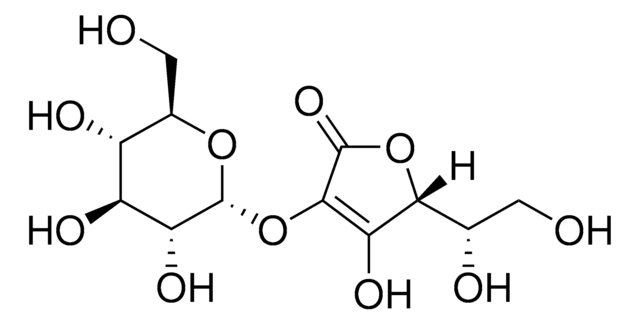49752
2-Phospho-L-ascorbic acid trisodium salt
≥95.0% (HPLC)
Synonym(s):
L-Ascorbic acid 2-phosphate trisodium salt, Sodium L-ascorbyl-2-phosphate
About This Item
Recommended Products
biological source
synthetic
Quality Level
assay
≥95.0% (HPLC)
form
powder
technique(s)
cell culture | mammalian: suitable
impurities
≤7.5% water (Karl Fischer)
color
white to off-white
pH
9.0-9.5 (25 °C, 30 g/L in H2O)
mp
260 °C
anion traces
chloride (Cl-): ≤50 mg/kg
sulfate (SO42-): ≤50 mg/kg
cation traces
Al: ≤10 mg/kg
As: ≤2 mg/kg
Ba: ≤5 mg/kg
Cd: ≤5 mg/kg
Co: ≤5 mg/kg
Cr: ≤5 mg/kg
Cu: ≤5 mg/kg
Fe: ≤10 mg/kg
Mg: ≤10 mg/kg
Mn: ≤5 mg/kg
Mo: ≤5 mg/kg
Ni: ≤5 mg/kg
Pb: ≤5 mg/kg
Sr: ≤5 mg/kg
Zn: ≤5 mg/kg
SMILES string
[Na+].[Na+].[Na+].[P](=O)([O-])([O-])OC1=C([C@H](OC1=O)[C@@H](O)CO)[O-]
InChI
1S/C6H9O9P.3Na/c7-1-2(8)4-3(9)5(6(10)14-4)15-16(11,12)13;;;/h2,4,7-9H,1H2,(H2,11,12,13);;;/q;3*+1/p-3/t2-,4+;;;/m0.../s1
Inchi Key
YRWWOAFMPXPHEJ-OFBPEYICSA-K
Application
Biochem/physiol Actions
Storage Class
11 - Combustible Solids
wgk_germany
WGK 3
flash_point_f
Not applicable
flash_point_c
Not applicable
ppe
Eyeshields, Gloves, type N95 (US)
Choose from one of the most recent versions:
Already Own This Product?
Find documentation for the products that you have recently purchased in the Document Library.
Customers Also Viewed
Our team of scientists has experience in all areas of research including Life Science, Material Science, Chemical Synthesis, Chromatography, Analytical and many others.
Contact Technical Service











